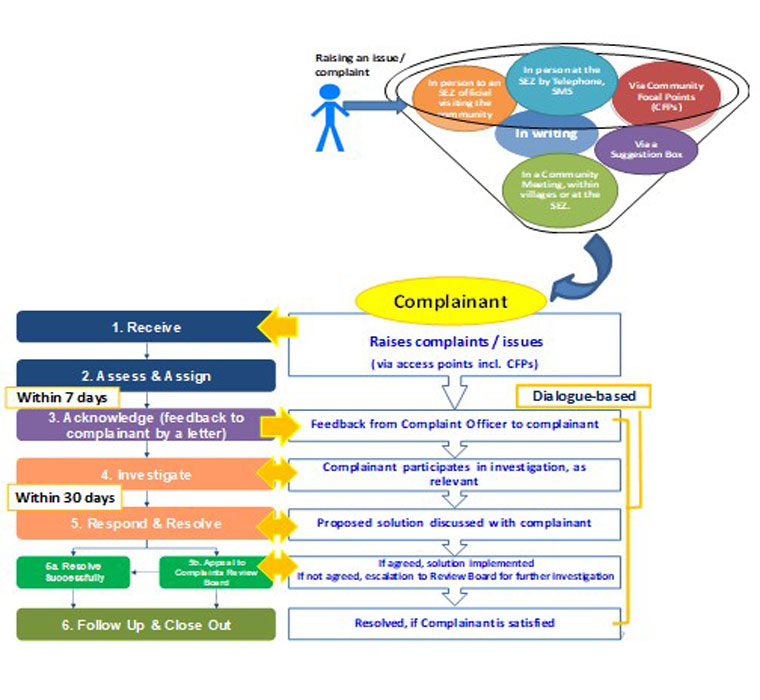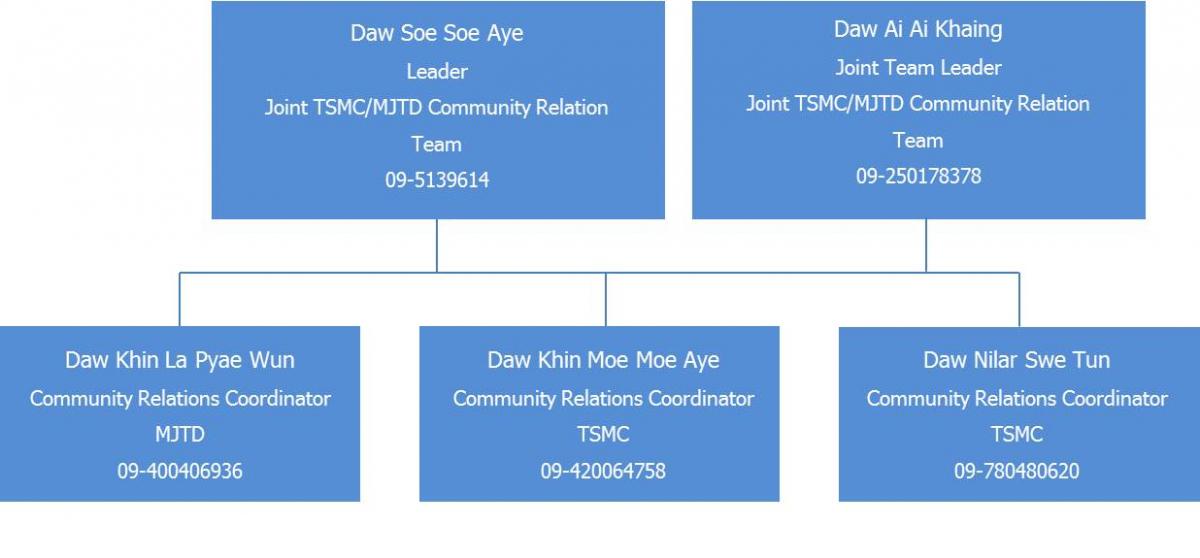1.Introduction
- The Thilawa Special Economic Zone (TSEZ) (or “the Project”) seeks to build strong relationships with stakeholders and manage the impact of its business activities on host communities. Nevertheless, it recognises that complaints about its activities may occur from time to time.
- The Thilawa SEZ Complaints Management Procedure (TCMP) allows stakeholders to raise questions or concerns with the TSEZ and have them addressed in a prompt and respectful manner. The TSEZ aims to address all complaints received, regardless of whether they stem from real or perceived issues.
- Any stakeholder who considers themselves affected by the TSEZ’s activities will have access to this mechanism at no cost. The statutory rights of the Complainant to undertake legal proceedings remain unaffected by participation in this process.
- TSEZ seeks to foster trust in the process and its outcomes. To this end it will communicate this TCMP in an understandable manner to affected stakeholder groups. Confidentiality will be respected and the TSEZ will take all reasonable steps to protect parties to the process from retaliation.
- This TCMP aligns with existing TSMC and MJTD directives and initiatives regarding responsible business, as follows:
- Thilawa Special Economic Zone (TSEZ) Management Committee Notice No. 04/2015: The Notice to Ensure the Responsible Investment in the Thilawa SEZ.
- The UN Global Compact (UNGC)’s Ten Principles; MJTD has been a signatory since October 2015.
- It also supports the TSEZ’s alignment with international good practice in stakeholder engagement.
- This TCMP is a process to effectively and proactively manage concerns and complaints and to provide communities and other stakeholders with a chance to have two-way dialogue with the Project about its operations. This complaints management procedure (TCMP) is designed to enhance outcomes by giving Project stakeholders satisfaction that their voices are being heard and that their issue was subject to formal consideration by the TSEZ.
- This complaints management procedure (TCMP) does not replace existing Myanmar legal processes, or TSEZ administrative processes already in use. In addition, it does not impede access to other judicial or administrative remedies that might be available through domestic law or through existing arbitration procedures.
1.1 Purpose
- The purpose of this document is to define the procedure for the TSEZ to manage stakeholder concerns and complaints raised in connection with its activities in a planned, timely, open and respectful manner.
- It describes the scope and procedural steps for the complaint handling process and specifies roles and responsibilities of the parties involved.
- It will be revised and updated periodically based on experience and feedback from stakeholders.
1.2 Objectives
This procedure has the following objectives:
- Establish a prompt, consistent and respectful mechanism for receiving, investigating and resolving complaints from the community, in a timely manner and by the most appropriate organisation and method;
- Ensure proper documentation of complaints and any corrective actions taken;
- Contribute to continuous improvement in performance through the analysis of trends and lessons learned;
- Identify and monitor stakeholder concerns to support effective stakeholder and risk management; and
- Meet requirements of international good practice.
2.Scope
This procedure has the following objectives:
- This complaints management procedure is open to all stakeholders who consider themselves affected by the Thilawa SEZ’s activities. It includes a focus on providing an access to remedy for 11 Project Affected Communities (PACs) and Project Affected Peoples (PAPs) potentially directly affected by the Thilawa SEZ’s activities.
- There are no restrictions on the type of issue a stakeholder can raise under this procedure. However, when a complaint is received that is more appropriately handled under a separate SEZ process (such as employment or business integrity related issues), it will be re-directed as appropriate in order to prevent parallel processes being followed. All complaints received under this TCMP shall be tracked until closed out, regardless of the process under which they are handled.
- The procedure is designed to provide a system for managing complaints from the general public and does not replace Myanmar legal processes, existing employee grievance management systems, normal business-to-business dialogue, or other management procedures already in place.
- The TSEZ reserves the right not to address a complaint that it reasonably considers amounts to no more than general, unspecified and therefore un-actionable dissatisfaction with the SEZ or concerns a matter for which the SEZ has no formal responsibility.
3.Channels for Raising a Complaint
There are a number of “channels” that can be used by community members to raise or file a complaint with the Thilawa SEZ. These include, but are not limited to:
- In person to an SEZ official visiting the community;
- In person at the SEZ;
- Suggestion boxes (to be established in village tract/ward administrator offices);
- Via Community Focal Points, if community desire;
- In writing to the SEZ; and
- At a community meeting held by SEZ representations, within villages or at the SEZ.

For the detailed information of TCMP, See more
- Thilawa SEZ Complaints Management Procedure.pdf
- TSEZ Complaints Management Form.

Joint TSMC/MJTD Community Relations Team (CRT)
